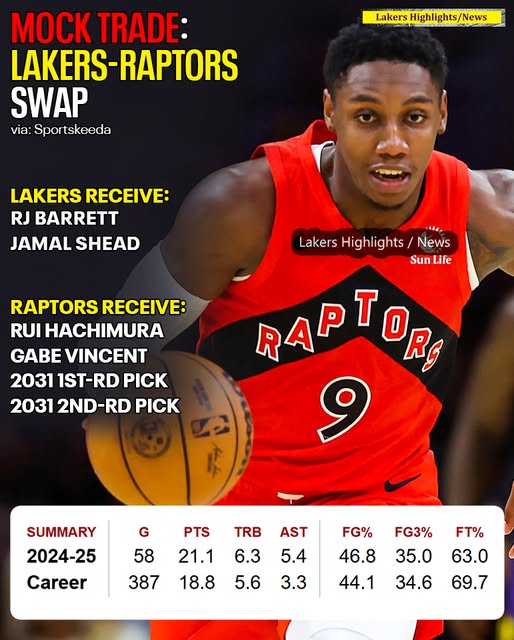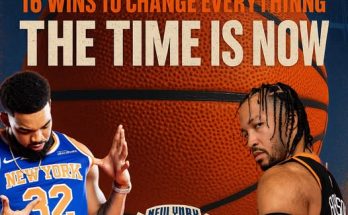The Los Angeles Lakers have made another intriguing move in their ongoing quest to rebuild a championship-caliber roster, acquiring RJ Barrett in a trade that brings the young, versatile wing to Hollywood. While the deal itself is notable for its basketball implications—adding a two-way player who can defend multiple positions and contribute offensively—it also underscores a subtle but significant shift in the power dynamics within the Lakers’ front office. Specifically, Barrett’s arrival signals the growing influence of WME (William Morris Endeavor) in the team’s roster decisions, a development that could reshape how the franchise operates in the years to come, especially in contrast to the once-dominant Klutch Sports.
Barrett, a former No. 3 overall pick, has shown flashes of brilliance throughout his career, particularly during his time with the New York Knicks and, more recently, the Toronto Raptors. At 6’6” with a strong frame, he possesses the physical tools to guard elite wings while also providing secondary scoring. His ability to attack the rim, absorb contact, and knock down open threes makes him an ideal fit alongside LeBron James and Anthony Davis, two superstars who thrive with complementary pieces that don’t require heavy usage to be effective. Defensively, Barrett has the potential to be a difference-maker, especially in a system that prioritizes versatility and switchability—traits that have defined the most successful Lakers teams of the past decade.
But beyond the on-court fit, Barrett’s acquisition is noteworthy because of the representation behind it. He is a client of WME, one of the most powerful talent agencies in sports and entertainment, which has been steadily expanding its footprint in the NBA. For years, Klutch Sports, led by Rich Paul, has been the dominant force in Lakers roster construction, leveraging its close ties to LeBron James and Anthony Davis to shape the team’s personnel decisions. From the trade for AD to the signings of Kentavious Caldwell-Pope, Talen Horton-Tucker, and others, Klutch’s influence has been undeniable. But with Barrett’s arrival, WME is making its presence felt in a way that suggests a shifting balance of power.
This isn’t to say that Klutch’s influence is waning entirely—LeBron James remains the face of the franchise, and his relationship with Rich Paul ensures that Klutch will always have a seat at the table. However, the Lakers’ front office, led by Rob Pelinka, appears to be diversifying its connections, perhaps in an effort to avoid over-reliance on a single agency. In recent years, WME has aggressively built its basketball division, signing high-profile clients like Barrett, Zach LaVine, and Jamal Murray. By bringing in a WME-represented player like Barrett, the Lakers may be signaling a willingness to work more closely with other agencies, creating a more balanced approach to roster building.
The implications of this shift are fascinating. For one, it could lead to greater flexibility in trade and free-agent negotiations. Relying too heavily on one agency can sometimes limit options, as teams may feel pressured to favor certain players or deals to maintain good relations with powerful agents. By cultivating stronger ties with WME, the Lakers may be positioning themselves to access a broader pool of talent, giving them more avenues to improve the roster. Additionally, as LeBron’s career enters its twilight years, the franchise may be preparing for a future where Klutch’s influence isn’t quite as overwhelming, ensuring a smoother transition whenever the King eventually steps away.
From a purely basketball standpoint, Barrett’s fit with the Lakers is intriguing. He’s not a superstar, but he doesn’t need to be. His role will likely be that of a high-level role player—a guy who can defend the opponent’s best wing, knock down open shots, and provide secondary playmaking when needed. His size and strength make him a capable rebounder for his position, and his experience playing in high-pressure markets like New York and Toronto should prepare him for the spotlight of Los Angeles. If he can improve his three-point consistency (a career 34% shooter from deep), he could become an invaluable piece alongside LeBron and AD.
There’s also the financial aspect to consider. Barrett is on a reasonable contract, making him a cost-effective piece for a team that is constantly navigating the luxury tax. The Lakers have struggled in recent years to find wings who can contribute on both ends without breaking the bank, and Barrett’s deal provides them with stability at a position of need. If he continues to develop, he could either become a long-term building block or a valuable trade asset down the line.
Of course, no move comes without risks. Barrett has had stretches of inconsistency, particularly with his shooting and decision-making. There have been questions about his efficiency, and while he’s shown improvement, he’s not yet the kind of player who can single-handedly swing a playoff series. The Lakers will need to put him in positions to succeed, leveraging his strengths while minimizing his weaknesses. Fortunately, playing alongside LeBron James tends to make life easier for wings, as his playmaking and gravity create open looks and favorable matchups. If Barrett can capitalize on those opportunities, he could thrive in L.A.
The broader narrative here, though, is about the Lakers’ evolving power structure. For years, Klutch Sports has been the dominant force behind the scenes, shaping the team’s roster in ways that align with its clients. That’s not necessarily a bad thing—after all, it helped deliver a championship in 2020. But an over-reliance on any single agency can create blind spots, and the Lakers’ recent struggles have exposed some of the limitations of that approach. By bringing in a WME client like Barrett, the front office is demonstrating a willingness to diversify its connections, which could lead to more creative and flexible roster construction in the future.
This isn’t a full-scale takeover by WME, nor is it the end of Klutch’s influence. Rather, it’s a subtle recalibration—a recognition that the best teams are built through multiple channels, not just one. The Lakers have always been a franchise that thrives on star power, but sustaining success requires more than just big names. It requires depth, versatility, and smart roster construction. Barrett’s arrival checks those boxes while also hinting at a new dynamic behind the scenes.
As the Lakers gear up for another playoff push, all eyes will be on how Barrett fits alongside LeBron and AD. But just as interesting will be watching how the front office navigates this shifting landscape of influence. If WME’s growing role leads to more savvy moves like this one, the Lakers could be setting themselves up for sustained success long after LeBron’s era comes to a close. For now, though, the focus is on the present—and with RJ Barrett in the fold, the Lakers have added another piece that could help them reclaim their place atop the NBA.
In the end, basketball is about winning, and the Lakers are doing what they can to put the best possible team on the floor. But the way they’re doing it—balancing competing interests, diversifying their connections, and making calculated bets on talent—suggests a franchise that’s thinking about both the short-term and the long-term. And in a league where the margin between success and failure is razor-thin, that kind of strategic flexibility might just be the key to staying on top.



